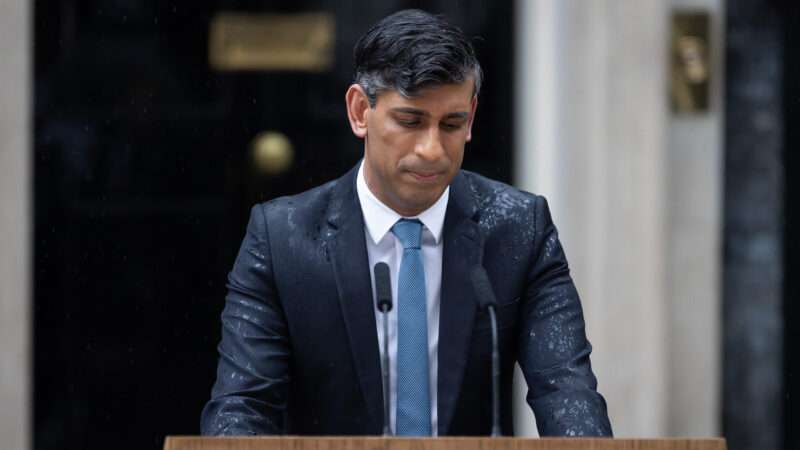
The results are in, and it's a landslide. After 14 years in power, Britain's Conservative Party has been expelled from office in the most dramatic of fashions—with its worst electoral result in decades.
Rishi Sunak, the man who pledged to restore stability after a ruinous period of high inflation and political chaos, has already tendered his resignation to the King. His successor—the former lawyer turned center-left politician Keir Starmer—will now lead Britain's first Labour government for almost 20 years, having won as many seats in parliament as former Prime Minister Tony Blair back in 1997.
What went wrong for Sunak? Honestly, the better question is where to start. Sunak had come into office in the fall of 2022 promising a technocratic overhaul: a series of five Key Performance Indicator-style pledges (on the economy, immigration, and the national health service) designed to restore trust in government. When he called the election back in May, he had just about achieved the fiscal ones (including halving inflation) but was no closer to solving the others.
Instead, Sunak's time in office was characterized by a lack of vision. Despite revealing himself as a critic of former Prime Minister Boris Johnson's lockdown-mania (albeit one who served in Britain's Covid government), Sunak's time in power seemed to revolve around petty authoritarian interventions designed to improve the behavior of teenagers. Signature initiatives included criminalizing near-harmless nitrous oxide, championing a smoking ban similar to the one introduced by former New Zealand Prime Minister Jacinda Ardern, and consulting on banning the sale of smartphones to children under 16 (like the smoking ban, this never actually came to pass).
After surprising everyone, including many of his parliamentary colleagues, by announcing a sudden election, Sunak offered his next big idea: the return of national service, under which Britain's teenagers would be forced to report for mandatory community work once a month. At a time of economic uncertainty and frustration, the prime minister seemed less like a great political reformer and more like a strict high school principal.
Goodness knows how it went down with the swing voters, many of whom, polls suggest, remain utterly exasperated at Britain's creaking public services and stagnant economy. By the time the general election arrived, the Conservatives were trailing in the polls to Labour not just on the headline figure, but also on policy issues that were once considered their political birthright like illegal migration (which hit new highs during Sunak's tenure).
There were other factors, too, on the campaign trail: notably, the return of Reform U.K. party leader Nigel Farage to the political frontline. Britain's parliamentary election system made the idea of a Farage-led government a non-starter. But his allure to a voter base built on Boris Johnson and Brexit was undeniable. Polls consistently showed that scores of previous Conservative voters had switched their allegiance to Farage's party.
In the end, Farage's party netted just four of 650 seats. By cannibalizing the right-wing vote, though, they made it much easier for Labour to pick up seats in northern England and the Midlands. To give Sunak his credit, he had consistently warned voters that such an outcome would happen. Either they called his bluff, or they just didn't care.
And what of the future? Conservative commentators have been quick to point out that there is no great wave of enthusiasm for Keir Starmer's Labour government. An assessment evidenced by the fact that, despite playing the electoral system masterfully, Starmer's Labour Party actually amassed fewer votes (both in net and percentage terms) than the far-left Jeremy Corbyn racked up in his landslide defeat in 2019.
Such facts are useful for trivia, but they both miss the fundamental point. Politics in Britain is as cynical as it is in other Western nations. Winners cross the finish line not thanks to flag-waving enthusiasm, but due to being the least worst candidate (as was the case for Tony Blair and David Cameron). The low vote share, meanwhile, can be largely explained by the surge in enthusiasm for "third party" candidates (namely the Liberal Democrats and Green Party).
Ultimately, Starmer proved successful in betting that he could win over the crucial middle-class voters by expunging the naive radicalism that characterized the Jeremy Corbyn years. Such clever branding may have won the election, but it won't translate to a plan for effective government. Not that Starmer is naive on that front. Apparently, his aides have already prepared a "shit list" of potential policy catastrophes that might derail any honeymoon.
One example on the list is the looming prison crisis. By official estimates, Britain's prisons are more than 99 percent full (the culmination of population growth and a failure to build anything in decades). Earlier this year, the Conservatives quietly began releasing prisoners early in order to free up space for incoming offenders. At least one of those released turned out to be a serious danger to children.
What will Labour do? Starmer's team have briefed the media that they will prioritize building more prison places. But doing so will cost money. Ever since the Liz Truss debacle—when a nominally right-wing prime minister spooked the markets by signaling her enthusiasm to increase dependence on borrowing—British governments have had to walk the tightest of fiscal tightropes. Solving the problem will likely require more taxation, or rerouting money from elsewhere.
Still, Starmer has at least some form for defying expectations. When he took control of the Labour Party back in April 2020, just months after the party's worst electoral result in a generation, even his closest allies were cautious about his chances of winning power. He's certainly managed that. As for what happens afterward, we'll just have to wait and see.
The post Labour Wins U.K. Elections as Conservatives Collapse and Third Parties Surge appeared first on Reason.com.







